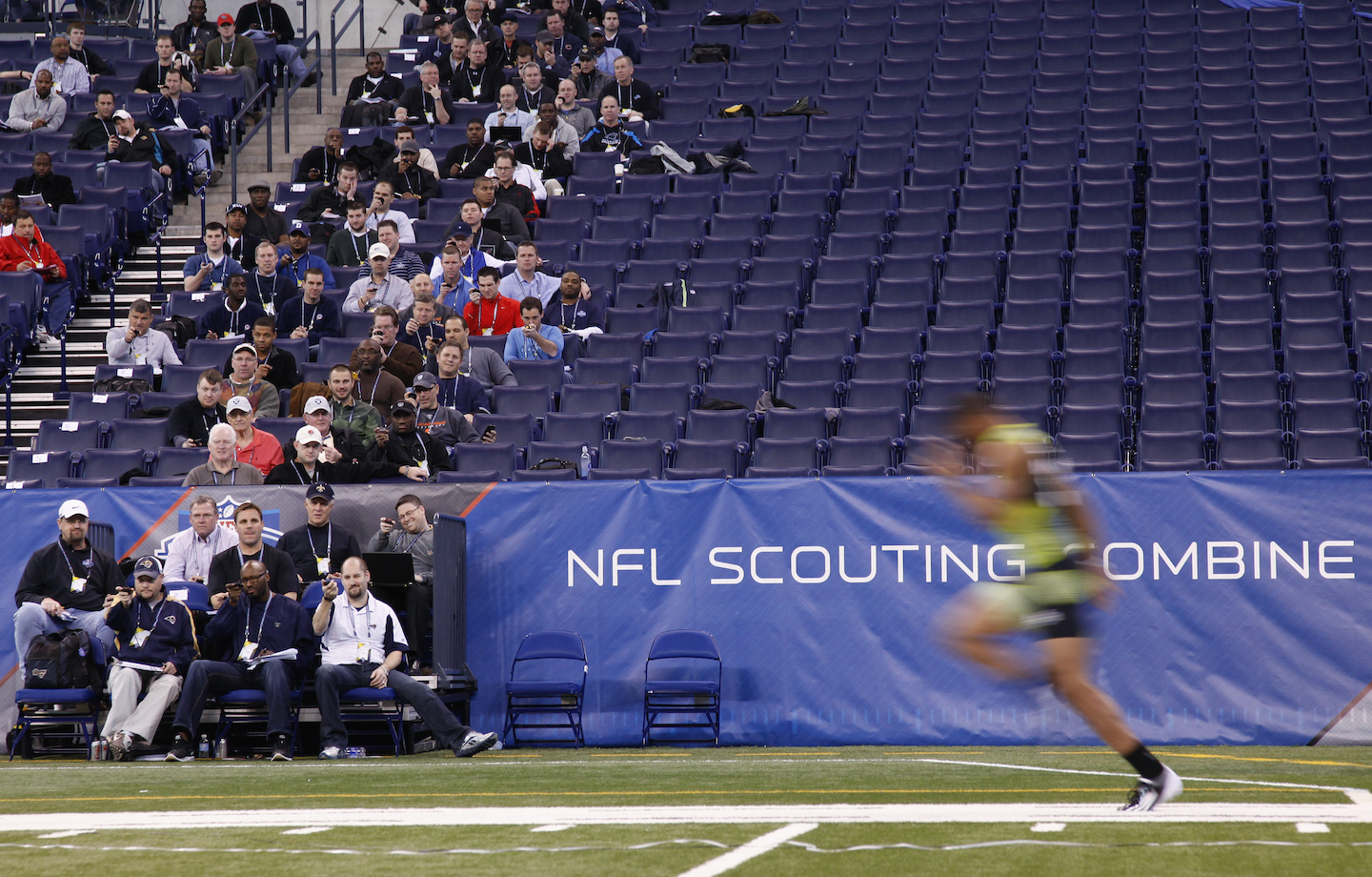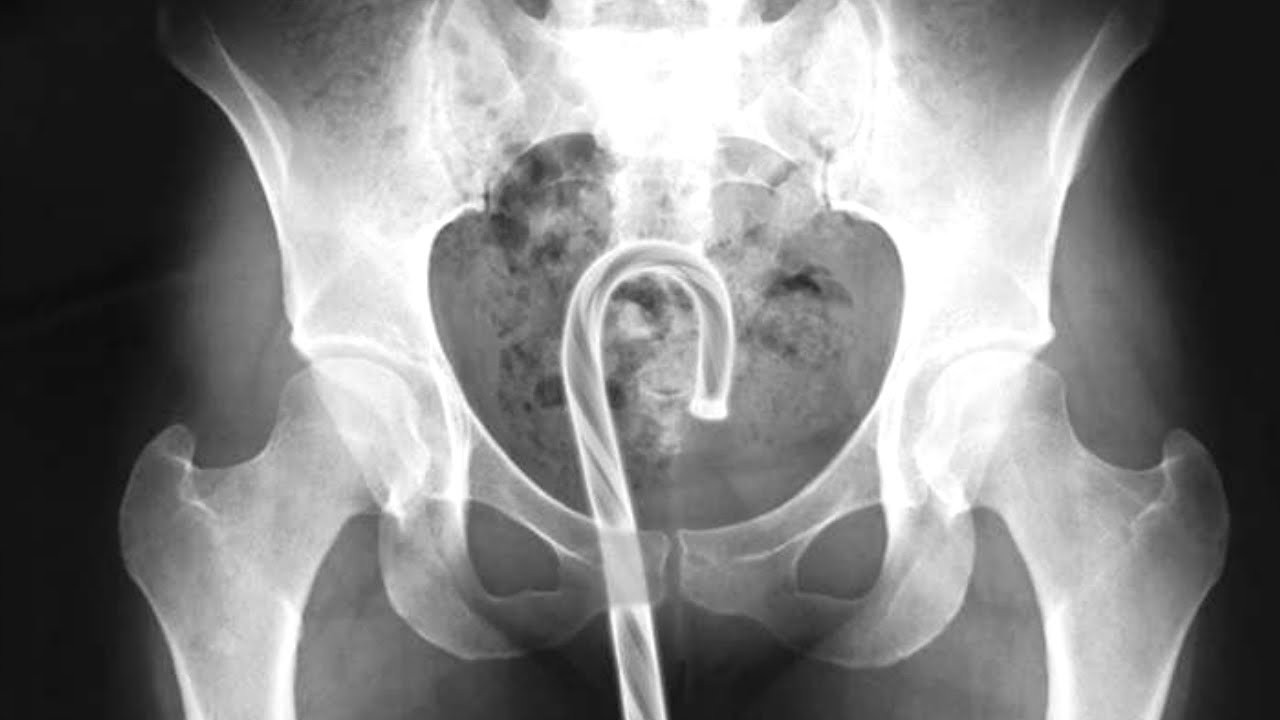I started getting to know scouts about four years ago, back in 2018. I was at a Northwestern football game, and I was trying to meet some scouts to help me with an NFL draft column that I was writing at the time. So I approached a scout to ask him about his responsibilities at that game. Back then, I didn't know much about what scouts actually did. This scout told me he'd been down on the field pregame for "body-typing." Body typing? That sounded interesting. The scout explained to me that he would stand as close as he possibly could to the players during warmups to get a good look at a prospect's body, which he then would describe in his scouting report. I asked him what he'd just written down about one player. He looked at his notes and said "smooth calves."
I had to laugh. Smooth? Like he shaved? No, no, the scout said. Smooth as in very little muscle definition—not what you want out of the calves.
I have not been able to get the phrase smooth calves out of my head since. Sometimes when I see a person with very little calf muscle, I find myself noting it in my head. Yep, smooth calves.
Where am I going with this? Scouts are sort of like journalists. They watch players, they ask questions about players, and they write reports about the players for their bosses to read. When a scout tells a general manager about a player in their area, chances are the GM isn't as familiar with the player and might not have watched the tape yet. So the scout has to use descriptive language to paint a picture about that player for the GM. What does this player look like physically? How does he play?
And like journalism, scouting has its problems and shortcomings. Scouting reports are littered with racial stereotypes and racially coded terms, and implicit racial bias clouds the entire judgement process. Scouting is an inexact science, and a scout's personal bias or experience can inform a lot of their opinions. Someone else might look at a pair of smooth calves and see some real muscle definition.
Like the adjective "smooth," scouts have developed their own glossary of phrases to talk about prospects. You've heard a lot of them in draft conversations before: high-motor, a me guy (as opposed to a we guy), ballhawk, pocket poise, etc. But what about the lesser known terms that are used regularly within draft rooms? I crowdsourced this list by asking a bunch of scouts for their favorite and most interesting scouting terms.
This list is by no means exhaustive, and every scout has their own style. Some GMs won't stand for these type of analogy-laden descriptions because it can create more confusion if they have to ask a scout what exactly he means when he wrote, "This guy looks like an unmade waterbed." Some scouts are straight to the point, and others like to have a little fun with it.
JAG (n): Just A Guy. Scouts love acronyms. This is a prospect who does not stand out athletically in any meaningful way. Camp body.
Use it in a sentence: Not worth a draft pick, total JAG.
Camp Body (n): A prospect without a long-term NFL future, someone who will just fill space in an NFL training camp and is sure to get cut.
Use it in a sentence: He had a good year in FCS, but he's probably just a camp body.
Our Guy, Our Type of Guy, That's a [TEAM NAME HERE] (n): This one reminds me of sorority rush. I really wanted to be a Pi Phi at Northwestern (it didn't work out), and I learned later that they have a code word for a girl that is a total Pi Phi. The word was "Tube Room," meaning this was the kind of girl that you wanted to hang out with and watch TV with her in the house's tube room. If any girl got three Tube Room votes, she was a Pi Phi for sure. Any variation of Our Guy, or Our Type of Guy, or That's a Commander is the NFL's version of this. Each team has its own styling. But there will be one phrase that, if said, conveys to everyone in the meeting that we want this dude.
Use it in a sentence: He's special. That's our guy.
Life-skills issues (phrase): Any longtime NFL follower has heard this phrase before. Scouts will tell you that it's meant to indicate that a player will need help from his NFL team as he transitions out of college life. Maybe he doesn't have a driver's license, or he's never had to find his own apartment, or manage his own money. The league office, and other people within pro football use the phrase as well, usually to describe programs they are trotting out as proof they do their best to keep players out of trouble.
But, like a lot of these words, it's extremely subjective and prone to bias. Most infamously, Dez Bryant got labeled with it before the 2010 draft.
One team executive explained to me that he hates this term because it often has a racist connotation when it's used to judge a player's upbringing. As he told me: "That is the token white guy line that’s saying that black guys don't know what they are doing in life."
The executive questioned why it matters in a scouting report if a player doesn't know how to cook, or pay their bills, or didn't have two parents in the home. This term is often used in conjunction with "immature" but, he wondered, what 22-year-old could really be considered mature and prepared for life as a professional anyway? The executive doesn't use the term himself and said he gets frustrated when he hears it from his colleagues.
Twitchy (adj.): Sudden quickness. Short fiber movement. Explosive movement in all directions. Very good term.
Use it in a sentence: That receiver is twitchy, he bursts out of his stance.
Oily hips (n): If a player has oily hips, he is really fluid and flexible, and he has a wider range of motion in his hips. This will make it easier for him to bend around a corner or around an edge.
Use it in a sentence: Marcus Peters has oily hips.
Linear (adj.): The opposite of oily hips. This is a player who is a little robotic in his movement and is a straight-line runner. It's not easy for him to change direction quickly.
Use it in a sentence: I don't know about that guy. He's fast, but he's stiff and linear.
Golf cart (n): This is a player with one speed only. No burst or acceleration.
Use it in a sentence: Man, he got caught quick. He's a golf cart.
Big bubble (n): Bubble is how scouts describe a prospect's glutes. This is a good term. And, yes, scouts regularly say the term bubble in a draft meeting, as in bubble butt.
Use it in a sentence: He's really toned. He has a big bubble.
Wood-toter's ass: Meaning a player with a flat ass, the opposite of big bubble. "Visualize a man carrying a bundle of logs in his arms and chest," one scout said.
Use it in a sentence: This guy has no anchor, he's got a wood-toter's ass.
Turd (n): A prospect who is not well-liked by his teammates. A guy who sucks the energy out of the room and is not fun to be around. Scouts told me they label a guy a turd after talking to their coaches and watching their body language.
Use it in a sentence: Josh Rosen wasn’t a turd, he was misunderstood.
Overachiever/ underachiever (n): An overachiever is a player who has limited athleticism but is really productive because of his work ethic and intangibles. An underachiever is a player who has a ton of natural physical talent and ability, but he doesn't work very hard or didn't have the right coaching. Teams think they can get more out of an underachiever if they put more time into him.
Use it in a sentence: He's probably peaked as a senior because he's an over-achiever.
Speed bump (n): This is a guy that can't tackle or can't block for long. If he's a defensive player, it means he doesn't wrap up offensive players when tackling. This is a player who instead will lower his body and throw it into guys to slow them down, like a speed bump. This is most often used for safeties that struggle to bring guys down. It also can be used for offensive linemen who get beat quickly on a regular basis.
Use it in a sentence: He's just a speed bump on the way to the end zone.
High floor, low ceiling (adj.): A safe pick but not a home-run pick.
Use it in a sentence: Kenny Pickett has a high floor, low ceiling. Malik Willis has a high ceiling and a low floor.
He stays blocked (phrase): Used when describing a defensive linemen or a linebacker who cannot break free from a block.
Use it in a sentence: He's not even doubled teamed here, and he stays blocked.
Feel the block/fight pressure (phrase) : The opposite of stays blocked. This is a DL with a good understanding of what the offensive lineman blocking him is trying to accomplish. “Maintaining leverage" or "gap discipline" are similar terms and are used to describe how well a defender plays in the scheme.
Use it in a sentence: He's not letting that OL win. He feels the block.
Feet stuck in the mud (phrase): A player who is slow-footed. Describing foot movement is very important for specific positions, like offensive lineman. Flat-footed is good, playing on toes or straight-legged is not good. Guys who play flat footed are balanced, with their weight equally distributed, meaning they are usually under control. (Yes, flat footed is usually a term for someone who is clumsy, but NFL scouts use it as a positive when discussing OL play.) Guys who play on their toes are usually too heavy and off balance. Guys that play straight-legged are too high, and tend to struggle with explosiveness.
Use it in a sentence: He got caught with his feet stuck in the mud there.
Unmade water bed (adj.): This is a very large, flabby lineman.
Use it in a sentence: Did you see that big guy run the 40? Rippling like an unmade water bed.
Wrecking ball/rolling ball of butcher knives/hair on fire (phrase): This is a maniac, a player who has a very high motor (aka, lots of energy) and arrives with mean intentions.
Use it in a sentence: This guy has no fear, total wrecking ball.
Stiffer than a honeymoon dick: Yes, this is a real term. I heard it from two different scouts who said it's old school and very common. It means the player is tight, rigid, linear, not flexible. And, no, I am not using in a sentence. You can figure that one out on your own.





